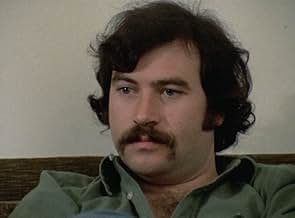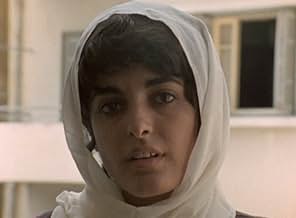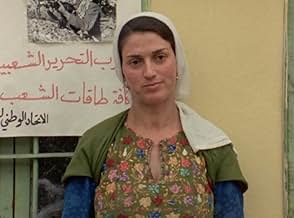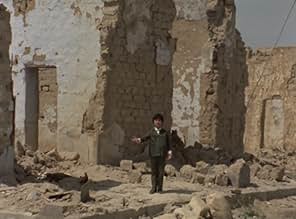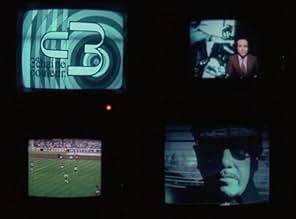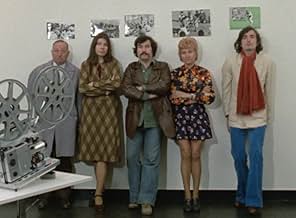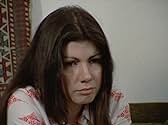I registi commentano le immagini girate in Palestina per un documentario, poi abbandonato quando i partecipanti furono uccisi durante un'operazione militare. Il materiale di repertorio è mes... Leggi tuttoI registi commentano le immagini girate in Palestina per un documentario, poi abbandonato quando i partecipanti furono uccisi durante un'operazione militare. Il materiale di repertorio è messo a confronto con una famiglia contemporanea.I registi commentano le immagini girate in Palestina per un documentario, poi abbandonato quando i partecipanti furono uccisi durante un'operazione militare. Il materiale di repertorio è messo a confronto con una famiglia contemporanea.
- Regia
- Sceneggiatura
- Star
Jean-Luc Godard
- Narrator
- (non citato nei titoli originali)
Anne-Marie Miéville
- Narrator
- (non citato nei titoli originali)
Recensioni in evidenza
Although the subject matter is still very relevant today, the metaphors and parallels drawn here are fairly trite. The parallel cultures are between the passive French, watching the war on television, and the Palestinians being interviewed and fighting for independence. The film becomes monotonous in its message, which leads the viewer to lose interest, and question the filmmakers. There are obvious criticisms of television, and Godard reveals the construct of film, but what of the filmmakers involvement with the Palestinians? I think a noble idea here did not crystalize, an unfortunate result. What of the Palestinians desire to be taken seriously by the world's journalists...? Godard generalizes them to a fault.
I was about ready to yell Hades at the TV in the first several minutes of Here and Elsewhere (or Ici et ailleurs): a pro-Palestine documentary? Take down the Zionists? I had heard before of Godard and his collaborator Anne Marie Mieville being anti-semitic, but this was ridiculous. Really? Calling terrorists 'revolutionaries'? Maybe there is no line to cross and every terrorist is a revolutionary, to a degree or another on their subjectivity. But then an audience member has to bring their own subjectivity, too, and the argument gets struck up and gets heated. While I can despise Godard personally for this and other instances in his career where one saw his distaste towards Jews, it's hard for me to also not acknowledge some level of artistic integrity on his end. Or maybe not. Maybe he is a damn fraud who gets by on counterfeit intellectualism and repetitive editing to swing past his ideas.
But then I do have to give credit where it's due: he did make a documentary hybrid here that is somewhat more lucid than other indecipherable docs of his ilk. Maybe it's because he did try and make in the early 70s a decidedly and truly pro-Palestinian militant documentary- hence the access his cameras got in to ask questions- but after a motorcycle accident and the dissolution of his "filmmaking collective" based on the filmmaker Dziga Vertov, he had to contemplate things. While Here and Elsewhere has the typical Godard flaws of being boredom and complacent with semantic BS (and that calculator, come again?) there is a sense that Godard and Mieville are trying to criticize themselves, and the very nature of the image. There's even a moment when Godard talks about being around a group of "revolutionaries" some months before the Black September attack, and says it was tragic nothing could've been said, to which Mieville rebuts "You, could've said something."
Perhaps, if only for the self-reflexiveness and an attitude that is more towards an analysis of image and response, of contrasting images of Nixon and Hitler and the holocaust and the whole "theater" and "actors" taking part in the games of death, Here and Elsewhere does have a sensibility that is about trying to make a film first, politics second. Not only did I not agree with the politics of the doc, it made me angry, as angry as I've ever been watching a Godard film. This mixed with some stretches of boredom made it far less than what others have praised the film to worth. And yet, at the same time, it is a significant and usually watchable work from a director who is atoning not so much for his beliefs but for not taking into account the memory of image and its cost of relying so heavily on the present-tense. It's an uneasy but satisfying blend of propaganda and self-conscious "cinema" cinema.
But then I do have to give credit where it's due: he did make a documentary hybrid here that is somewhat more lucid than other indecipherable docs of his ilk. Maybe it's because he did try and make in the early 70s a decidedly and truly pro-Palestinian militant documentary- hence the access his cameras got in to ask questions- but after a motorcycle accident and the dissolution of his "filmmaking collective" based on the filmmaker Dziga Vertov, he had to contemplate things. While Here and Elsewhere has the typical Godard flaws of being boredom and complacent with semantic BS (and that calculator, come again?) there is a sense that Godard and Mieville are trying to criticize themselves, and the very nature of the image. There's even a moment when Godard talks about being around a group of "revolutionaries" some months before the Black September attack, and says it was tragic nothing could've been said, to which Mieville rebuts "You, could've said something."
Perhaps, if only for the self-reflexiveness and an attitude that is more towards an analysis of image and response, of contrasting images of Nixon and Hitler and the holocaust and the whole "theater" and "actors" taking part in the games of death, Here and Elsewhere does have a sensibility that is about trying to make a film first, politics second. Not only did I not agree with the politics of the doc, it made me angry, as angry as I've ever been watching a Godard film. This mixed with some stretches of boredom made it far less than what others have praised the film to worth. And yet, at the same time, it is a significant and usually watchable work from a director who is atoning not so much for his beliefs but for not taking into account the memory of image and its cost of relying so heavily on the present-tense. It's an uneasy but satisfying blend of propaganda and self-conscious "cinema" cinema.
French director Jean-Luc Godard had declared that his soul was Palestinian. That being the case, it was hardly surprising that, in 1970, the Palestinian nationalist political party, Al Fatah, commissioned Godard, Jean-Pierre Gorin, and others from the Dziga Vertov cinema set to produce a documentary of Al Fatah's ongoing conflict with the nation of Israel. However, the work could not be realised because a large percentage of the Palestinians utilised in its filming had been killed and it was clear that apart from those slain, there was insufficient subject matter that would be appropriate in order to complete the film. The documentary is woven of fragments taken from the original effort: JUSQU'À LA VICTOIRE (Until Victory), in its alteration becoming a cinematic treatise that explores quite different material: the failure of the initiating footage to credit the reality of its combined images that are than orientated by Godard, Gorin and Anne-Marie Miéville (Godard's third wife) into a political tract that centres upon such themes as genocide and socially acceptable persecution, concluding finally that any sort of staged presentation will be rampant with a medley of contradictions impeding, of necessity, completion of a filmed construct. The "Here" (ICI) of the title signifies a contemporary Parisian family of four, including two children, that is counterpoise for the "Elsewhere" (AILLEURS), referent to Palestine, and becoming a contrast of how each reflects the nature of varying images, and how reality may be determined through these. Godard's disaffection with Dziga Vertov cinema theory is palpable by his shift toward a "softer" use of sound, with less of the type of declamatory that inevitably will propel one voice to a position of dominance over others, regardless of their shared substance. In many instances, this piece will seem to some as having been abstracted from feminist politics that are saturated with impenetrable psychoanalytic dogma, especially whenever male and female voiceovers question the nature of the images that we see, yet we profit by realising that the film provides scaffolding toward the comprehension of the lengthy partnership between Godard and Miéville while offering early footage recording many Palestinians who were slain during the Black September hostilities. Godard states here "The actors in this film were filmed in danger of death". Later, as he tries to efficiently combine multiform imagery in the face of widespread unconcern, he avers that "everywhere things are going badly". A Maoist of long standing at the time of this production, Godard, who considered the Chinese leader as a grand theorist of revolutionary politics, depicts the wife and mother of the mentioned French family group reading the canonical text of Maoists: the Little Red Book. Additionally, he strives, as a moral obligation, to follow his own procedural hypotheses; yet, it is Miéville whose decision to remold the work from its disparate parts that bestows Godard with a fresh perception of death's immediacy. Further, it is Miéville who translates and clarifies for viewers the cadences and symbolic movements of a very young Palestinian girl who, during the film's early minutes, pleads for her fellow rebels to aggressively "reclaim the revolution". Gorin was the primary intellectual force that actuated French-based Maoism, and it was his support of Miéville for her effort to repattern the footage of JUSQU'À LA VICTOIRE that resulted in its modification beneath her hands and those of Godard, the two sharing, by voice-over, visual and audio rumination upon the meaning of history, utilising powerful cinematic imagery that brings established events into the grain of a viewer's consciousness. Ultimately, we must resolve to ascertain the meaning of these without assistance from external direction. The film has not been released in DVD format, but still can be occasionally located as a Facets VHS having good picture and sound quality. The text is in French with excellent English subtitles. This work will be of most value for Godard enthusiasts who will not mind unexplained detail, and for those interested in the aesthetics of deconstructionism, and in particular the critical compositions of Michel Foucault.
Frequently criticized for supposedly being blindly pro-PLO and nearly propagandistic (I suspect by people who haven't actually seen the film, mostly), Jean-Luc Godard's "Dziga Vertov" group shot "Ici et ailleurs" in 1970 in Palestine and Jordan, and no longer a member, Godard later edited the footage into this remarkably interesting short feature.
For all the accusations of antisemitism that this film has gotten, it is remarkably critical of much of what the PLO is doing. Of course, in the limited mindset of 'you either support Israel or not', Godard and Anne-Marie Mieville daring to question Israel's practices might be considered antisemitic, but their criticism of the PLO's dogmatic politics are far more frequently used in the film, and perhaps even more biting.
The film is far too complex for such simple analysis. Coming shortly after Godard made several of his most difficult (and preachy, and annoying, and worst) films, "Ici et ailleurs" is a remarkable visual essay on the difficulty of documentary film-making, especially political documentaries, and the relationship between images and reality.
"Ici et ailleurs" is remarkably provocative and exceptionally candid, coming far closer to the heart of the PLO and the people involved than any news report or documentary from the time that I've managed to track down. In that sense it is especially important for history buffs, but not for those looking for education on the matter as this film assumes the viewer has full knowledge of what was going on at the time.
The final ten minutes or so are especially interesting, and all in all "Ici et ailleurs" is unquestionably thought-provoking and not at all trite in any way in its approach and execution. It is never self-important, always asking questions and never stating anything outside of the guarded opinions of the filmmakers (who present their opinions as opinions and not fact), the film achieves the sort of lack of manipulation that few documentaries do. I doubt this film will ever see a big DVD release, especially not in North America, but it must be seen by as many as possible, if not for its quality (which is certainly debatable) then for its unique candidness.
9.5/10
For all the accusations of antisemitism that this film has gotten, it is remarkably critical of much of what the PLO is doing. Of course, in the limited mindset of 'you either support Israel or not', Godard and Anne-Marie Mieville daring to question Israel's practices might be considered antisemitic, but their criticism of the PLO's dogmatic politics are far more frequently used in the film, and perhaps even more biting.
The film is far too complex for such simple analysis. Coming shortly after Godard made several of his most difficult (and preachy, and annoying, and worst) films, "Ici et ailleurs" is a remarkable visual essay on the difficulty of documentary film-making, especially political documentaries, and the relationship between images and reality.
"Ici et ailleurs" is remarkably provocative and exceptionally candid, coming far closer to the heart of the PLO and the people involved than any news report or documentary from the time that I've managed to track down. In that sense it is especially important for history buffs, but not for those looking for education on the matter as this film assumes the viewer has full knowledge of what was going on at the time.
The final ten minutes or so are especially interesting, and all in all "Ici et ailleurs" is unquestionably thought-provoking and not at all trite in any way in its approach and execution. It is never self-important, always asking questions and never stating anything outside of the guarded opinions of the filmmakers (who present their opinions as opinions and not fact), the film achieves the sort of lack of manipulation that few documentaries do. I doubt this film will ever see a big DVD release, especially not in North America, but it must be seen by as many as possible, if not for its quality (which is certainly debatable) then for its unique candidness.
9.5/10
...with the possible exception of Godard's masterly "Marxist
Western" WIND FROM THE EAST. Godard's onetime crony Jean-Pierre Gorin shot some 16mm footage of Palestinian
resistance fighters in 1970; shortly thereafter, almost all the
people Gorin recorded were dead. Godard's film--with some
pungent, questioning commentary by Anne-Marie Mieville--uses
the footage to ask questions about "the representation of the
other": the interesting part is that Godard includes "the politically
sympathetic representation of the other" into his mix. Just when
you start noticing that Gorin's images of cute Palestinian children
doing commando exercises smacks of the Riefenstahlian, Mieville
comes along to point that out more succinctly and poetically than
you ever could. As poetic and eggheadily insular as Godard's
dialectic is, he interrogates the political image more thoroughly
than anyone else in movies. He does it by way of a close reading
that will only fail to exasperate those used to old-school
deconstructors: Godard mines a tremendous amount of insight
through a searching examination of his own use of the word "and"!
In an age when our experience of World War Three is massively
mediated by MSNBC and Fox News (and, as Godard points out,
their images, not just their Limbaughian play-by-play), ICI ET
AILLEURS is a needed deprogramming device. For God's sake,
find some obscure video store and rent it.
Western" WIND FROM THE EAST. Godard's onetime crony Jean-Pierre Gorin shot some 16mm footage of Palestinian
resistance fighters in 1970; shortly thereafter, almost all the
people Gorin recorded were dead. Godard's film--with some
pungent, questioning commentary by Anne-Marie Mieville--uses
the footage to ask questions about "the representation of the
other": the interesting part is that Godard includes "the politically
sympathetic representation of the other" into his mix. Just when
you start noticing that Gorin's images of cute Palestinian children
doing commando exercises smacks of the Riefenstahlian, Mieville
comes along to point that out more succinctly and poetically than
you ever could. As poetic and eggheadily insular as Godard's
dialectic is, he interrogates the political image more thoroughly
than anyone else in movies. He does it by way of a close reading
that will only fail to exasperate those used to old-school
deconstructors: Godard mines a tremendous amount of insight
through a searching examination of his own use of the word "and"!
In an age when our experience of World War Three is massively
mediated by MSNBC and Fox News (and, as Godard points out,
their images, not just their Limbaughian play-by-play), ICI ET
AILLEURS is a needed deprogramming device. For God's sake,
find some obscure video store and rent it.
Lo sapevi?
- ConnessioniEdited into Damned! Daney (1991)
I più visti
Accedi per valutare e creare un elenco di titoli salvati per ottenere consigli personalizzati
Dettagli
- Tempo di esecuzione53 minuti
- Mix di suoni
- Proporzioni
- 1.37 : 1
Contribuisci a questa pagina
Suggerisci una modifica o aggiungi i contenuti mancanti

Divario superiore
By what name was Ici et ailleurs (1976) officially released in Canada in English?
Rispondi
